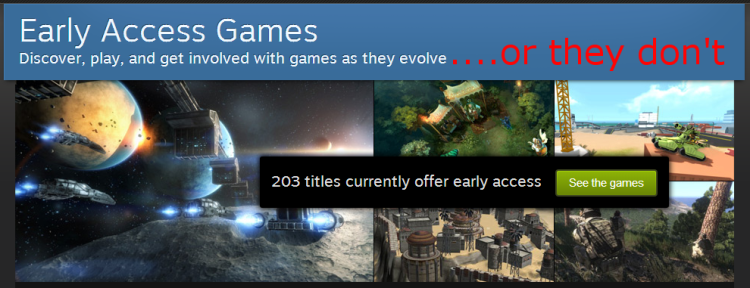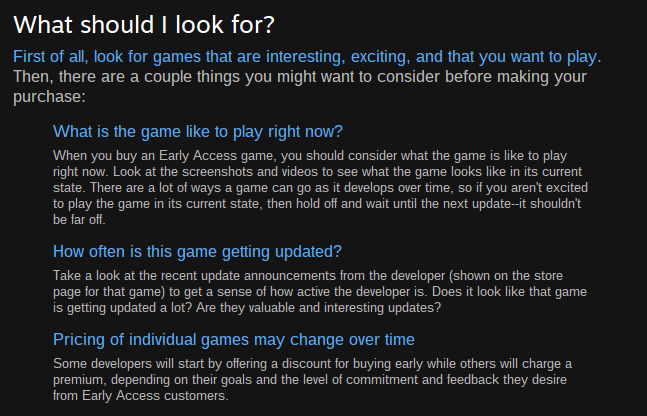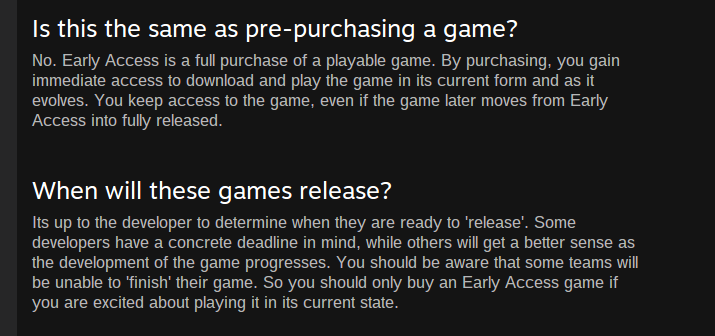The legal perspective on Early Access
Jesse Saivar, a partner and the chair of the intellectual property department at law firm Greenburg Glusker, discussed the legal implications of Early Access and what it means to Steam customers, via Skype.
Saivar explained that the Federal Trade Commission is the body responsible for monitoring business practices, with Section 5 of the FTC Act prohibiting “unfair and deceptive practices.”
“What Valve and Steam really have to be careful of is that they’re not doing anything that would be deceiving consumers,” explained Saivar.
Saivar took a look through the Early Access page (as it appeared on May 22) in order to gauge whether Valve was “giving consumers enough information for them to understand that there are these risks.”
He said that there were just enough subtle warnings to ensure that Valve was towing the line, but he did raise a couple of concerns.
“I would probably advise as a lawyer that you should have something somewhere where you’re making it very clear to the consumers that what you’re buying is a game in development,” said Saivar, “‘We make no warranties that this game is going to be completed, or that all the bugs that may be present in an in-development game are going to be fixed.’ So you’re buying at your own risk. I think that they could do a better job of doing that.”
Saivar was also concerned that there was no hyperlink to specific terms and conditions when going through the payment process for an Early Access title, but “even without that, I think this page that describes what Early Access is probably does enough,” he said.
However, when I brought up the paragraph titled “Is this the same as pre-purchasing a game?” Saivar had some reservations.
“That one paragraph is the most problematic,” he told me. “Of everything they have in here, that’s the one that seems to imply it’s going to be released. It doesn’t ever say there’s a chance it may never be released. It kind of implies it could be a long time until it’s released.”
“If I was their attorney,” he added, “and I was looking at this I would say you’ve got to ease up on those because it does seem to imply that these will eventually be released and if consumers are buying these games with the expectation that they will eventually be released, and that’s why they’re getting involved, then that’s where they could run into some trouble.”
Saivar concluded that Valve was not immediately at risk, but if enough people complained that Early Access cheated them, as happened with children making in-app purchases, the FTC might investigate.
Valve’s response
GamesBeat reached out to Valve multiple times but they didn’t respond to our requests for comment on Early Access. However, the issues raised by our lawyer, which we questioned Valve about, seem to coincide with some major changes in the description of Early Access to Steam customers.
We broke the news yesterday about Valve’s changes to the Early Access FAQ, and you can see the major wording alterations in the screenshots below.
Gone is the promise that you gain access to an Early Access game “in its current form and as it evolves up and through release.” Instead, Valve says: “You keep access to the game, even if the game later moves from Early Access into fully released.” [Our stress on the word “if”]
Before the change, Valve told customers: “If the release date is known, it will be listed on the store page for the game, in the upper-right corner under the game’s branding image.” There was no mention of the possibility that a game might remain unfinished.
Now, the description reads: “You should be aware that some teams will be unable to ‘finish’ their game. So you should only buy an Early Access game if you are excited about playing it in its current state.”
A small victory, then, in giving consumers a clearer picture of what they are getting with Early Access, but a significant shift in the goals of the program.
No longer can customers buy into Early Access with the assumption that they are getting a finished product at the end of the day. In fact, there is no telling when any of the projects on Early Access will reach completion, if indeed they do.
GamesBeat reached out a final time to Valve, and Doug Lombardi, director of marketing, provided the following statement:
“The changes to the FAQ are intended to help set customer expectations of what may or may not happen over the course of development of an Early Access game. We frequently iterate on Steam features as we gather feedback and find areas for improvement.
“In this case, it became apparent that further clarification would help customers evaluate their potential purchase of Early Access titles. We think of Steam, Early Access, and game development as services that grow and evolve best with the involvement of customers and the community.”
The future for Early Access
When I explained to Saivar that there was reportedly little or no curation of projects accepted for Early Access and no demands on them for regular updates, he described it as a “dream for lazy developers.” However, for studios that actually care about completing their game, Early Access may be more of a nightmare.
Early Access in its current form seems to favor larger developers with the time and resources to drip-feed updates to an engaged community. Smaller developers can’t always deliver the level of attention, progress, and engagement that Steam customers expect.
All of the developers I spoke to seemed genuinely passionate about their projects. But they are generally single-handed or part of a very small team. Williams explained that Early Access customers have reported close to 50 bugs in Gravi. He’s now desperately trying to fix these before he can focus on moving the project forward.
“The project is not dead,” he said, “it’s just moving at a mock-snail pace because I cannot afford further development costs. I’m locked in with high interest loans as I try to pay down Gravi, and the game has not even made a third of its money back.”
So while games like Day-Z and Rust have generated millions of dollars through Early Access, the significantly smaller amount of money many projects raise can have little or no impact on development, leaving an incomplete game, frustrated customers, and developers trying desperately to keep afloat.
“I’m all about the indie developers, said Williams. We’re all working out of our homes. We’re putting our life savings into a dream.”
Is Early Access helping with that dream? “I would like to say yes, but no,” he said. “It hasn’t helped us with that dream.
“We spent $60,000 to build Gravi. Early Access made it so that we could get about $15,000 of that back. It got us closer to a break-even point, but it didn’t really help us in terms of clearing our debt.”
Williams told me he was expecting a lot better. “I know some games that have gone on Early Access or Steam that have done over $100,000 in the first six months,” he said.
When I asked Williams if he’d use the Early Access process again, the answer was a resounding “no.”
“We wouldn’t do that if we were going to do another game,” he told me. “If we had a bigger team, it would be another story. We could put it up there, we could be getting feedback from the users, and we could be actively fixing those bugs as they come in. Just the three of us? There’s just no way we can keep up.”
VentureBeat's mission is to be a digital town square for technical decision-makers to gain knowledge about transformative enterprise technology and transact. Learn More






